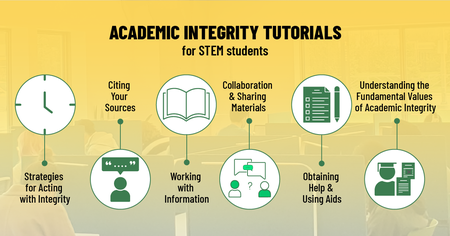As part of eCampus Ontario’s Virtual Learning grants, a new series of online self-paced tutorials that build skills in academic integrity for STEM students, was recently launched on the Library’s Online Learning Object Repository.
 Available in both English and French and open to all students, the six modules cover foundational knowledge every STEM undergraduate student needs to know as they progress through their studies, including collaboration and sharing materials, citing sources, and strategies to act with integrity. While these topics are often covered in humanities subjects in high school, the same type of knowledge is often not taught in STEM courses at that level. These modules seek to fill that gap by providing real-world examples specific to all four STEM disciplines (science, computer science, engineering and math) so all undergraduate students can progress through their studies with a standardized base of knowledge and clear understanding of how these topics relate to circumstances unique to STEM fields.
Available in both English and French and open to all students, the six modules cover foundational knowledge every STEM undergraduate student needs to know as they progress through their studies, including collaboration and sharing materials, citing sources, and strategies to act with integrity. While these topics are often covered in humanities subjects in high school, the same type of knowledge is often not taught in STEM courses at that level. These modules seek to fill that gap by providing real-world examples specific to all four STEM disciplines (science, computer science, engineering and math) so all undergraduate students can progress through their studies with a standardized base of knowledge and clear understanding of how these topics relate to circumstances unique to STEM fields.
The project, co-led by Amanda McKenzie (Office of Academic Integrity) and Dr. Kari Weaver (Library), contributes to the University’s strategic commitment to advance a learning environment that “supports high-quality, open content and digital learning options.” Benefiting heavily from subject expertise and input from a wide variety of external collaborators, the core development team of Weaver, McKenzie, as well as Erin Nearing (Office of Academic Integrity) and Maria Barichello (Student Success Office) created the content, and the Library’s instructional design team designed the modules. Special thanks go to Mike Chee, open education librarian, who kicked-off the project by applying to eCampus Ontario for support.
Early feedback on the tutorials has been extremely positive, with both students and instructors alike. The next step is to share this resource with instructors so they can encourage students to work through the six modules to develop a firm grasp of academic integrity concepts that will serve students well through their undergraduate studies and beyond.




